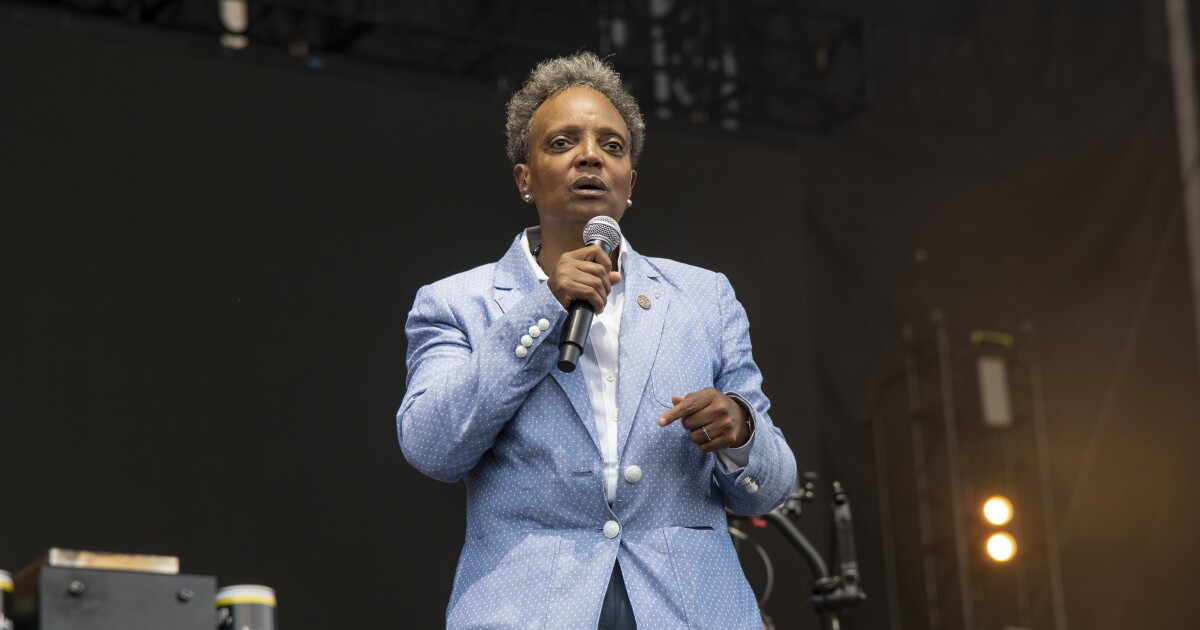

Chicago Mayor Lori Lightfoot will learn from voters on Tuesday whether they think she deserves a second term — or whether she has to spend the next five weeks trying to convince them she does in a runoff election.
Facing eight challengers, Lightfoot would have a mathematically difficult time locking up more than 50% of the vote even if she were broadly popular.
LORI LIGHTFOOT’S CHANCES OF MAKING RUNOFF DECLINING
That does not appear to be the case. One recent poll had Lightfoot earning just 13.6% of the vote, trailing two rivals.
An internal poll shared earlier this month by the Lightfoot campaign still had her struggling to connect with voters with 24% of the vote share, although it showed the incumbent Democrat in first place.
Lightfoot’s precipitous fall from the good graces of Chicago voters could offer insight into how attitudes may shift heading into the next election cycle. Although she won her seat in 2019 with a landslide 48-point victory, which she managed by hammering home her liberal bona fides, her brand of politics has lost popularity with many voters.
“There’s fatigue with the status quo, but that’s true all across the country,” Charles Lipson, political science professor emeritus at the University of Chicago, told the Washington Examiner. “My sense is that the whole country is angry, disappointed, feels betrayed by the experts who were supposed to know the right answers and haven’t.”
That sentiment, Lipson noted, feeds into Lightfoot’s struggles with voters.
“I would say bad outcomes in the city and a sense that the mayor has not produced better outcomes,” Lipson said of why Lightfoot faces such a difficult path to reelection. “She doesn’t have any answers to the problems of crime and bad education and the streets are filled with potholes, and it’s not like taxes aren’t very high — they are.”
“So it’s not like there’s not enough money coming in,” he added.
Crime has worsened on Lightfoot’s watch, as it did in most U.S. cities during the pandemic.
Murders fell in 2022 after hitting a quarter-century high in 2021, but that did not spell an overall return to safety in the city.
Violent crime increased last year over the deadly level it hit in 2021, driven in part by a 23% increase in the number of robberies.
Lightfoot has failed to get a handle on Chicago’s education crisis, too.
More than 87,000 students have left the city’s public school system over the past decade, according to the Illinois Policy Institute, and proficiency levels for the students who remain have fallen steadily over that time period.
At the same time, the system’s budget and operating costs have exploded, thanks in large part to the power of the Chicago Teachers Union.
That union could play a key role in Tuesday’s mayoral primary.
Cook County Commissioner Brandon Johnson landed the endorsement and financial backing of the Chicago Teachers Union, which has helped him build credibility as a progressive contender in the race.
Lightfoot has openly feuded with the union over teacher strikes and student retention problems.
Meanwhile, former school superintendent Paul Vallas has surged by pitching himself as tougher on crime than Lightfoot. Recent polling suggested Vallas has emerged as the unexpected front-runner in the crowded field.
Vallas has slammed the “utter breakdown of law and order” in Chicago and promised to overhaul the city’s police department, including by firing its leader and hiring hundreds more officers.
He has also proposed loosening the city’s restrictions on when officers can chase a suspect, as well as cracking down on lower-level crimes that Chicago law enforcement leaders have stopped prosecuting.
Vallas has pursued a playbook similar to the one that propelled New York City Mayor Eric Adams over a crowded Democratic primary field in 2021. Decrying New York City’s intense crime problem, Adams ran to the right of liberal rivals in a multiperson primary in which his message found unexpected resonance.
Adams’s victory foreshadowed problems for his party in New York. The following year, Democrats lost races, or came closer than usual to losing them, despite their party outperforming expectations virtually everywhere else in the country.
Lightfoot’s inability to get a handle on a crime problem that predated her has offered a similar opening to her Democratic challengers.
Rep. Jesus “Chuy” Garcia (D-IL) has worked to maintain his image as a progressive while criticizing the incumbent over crime. Like Vallas, he has vowed to fire the current police superintendent and add more officers to the force.
CLICK HERE TO READ MORE FROM THE WASHINGTON EXAMINER
“A mayor who cannot keep us safe is a mayor we cannot afford to keep,” Garcia said last month.
The top two vote-getters after Tuesday, assuming no candidate earns more than 50% of the vote, will advance to an April 4 runoff.







